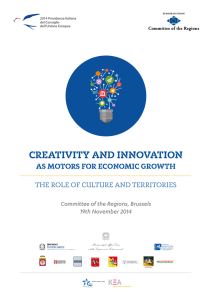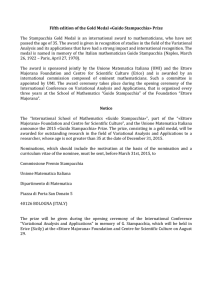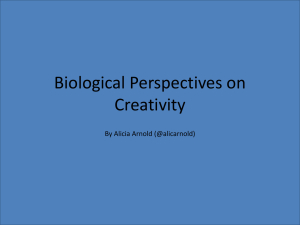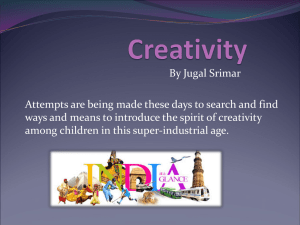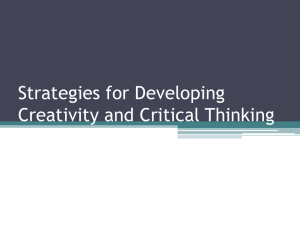salone dello studente 2015 - Ufficio scolastico regionale per la
advertisement
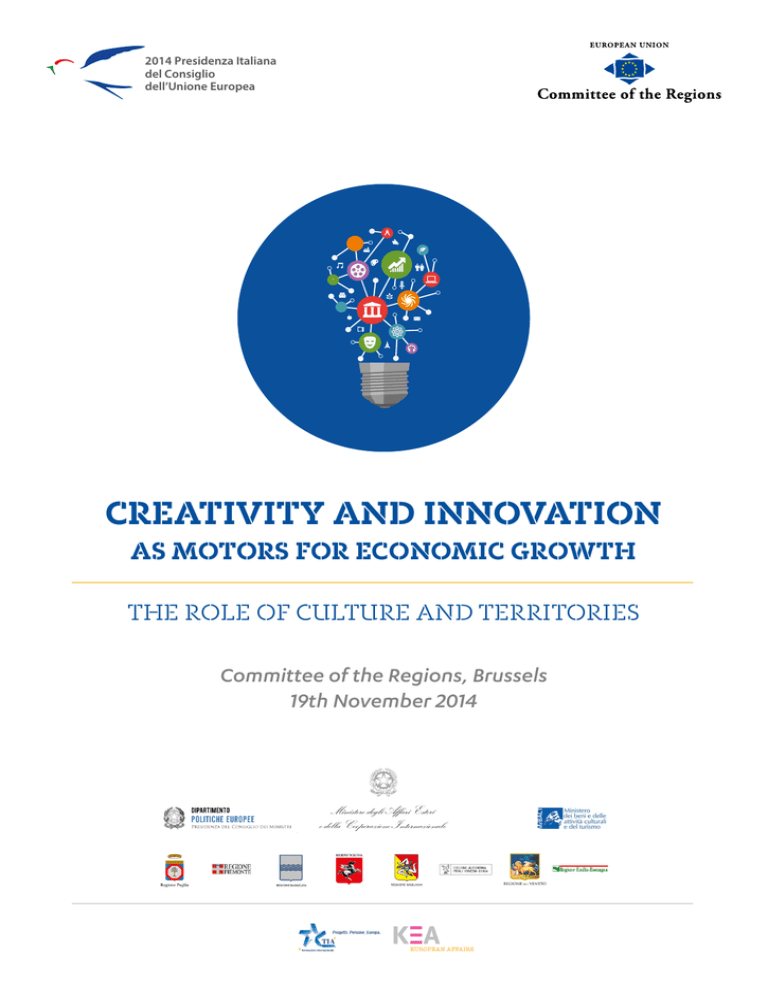
2014 Presidenza Italiana del Consiglio dell’Unione Europea CREATIVITY AND INNOVATION AS MOTORS FOR ECONOMIC GROWTH THE ROLE OF CULTURE AND TERRITORIES Committee of the Regions, Brussels 19th November 2014 2014 Presidenza Italiana del Consiglio dell’Unione Europea CREATIVITY AND INNOVATION AS MOTORS FOR ECONOMIC GROWTH THE ROLE OF CULTURE AND TERRITORIES Background note Creativity and innovation represent a truly “new start for Europe” to relaunch the economy and society. Culture and Creative Industries (CCIs) have proved to be resilient to the crisis with innovative solutions contributing to growth and jobs. In this context, significant experiences have been carried out at regional and local level, where, to a large extent, CCIs are established and developed. These experiences need to be shared and strengthened at EU level in order to attract and increase investments, ensure synergies and measure the effective impact in the different economic sectors. Indeed, despite a new general awareness of the innovation potential of the sector, challenges such as a fragmented cultural market, access to finance and digital shift have to be overcome to truly exploit the economic potential of CCIs. Cultural policies need to be conceived as a stronger tool to raise awareness, among public audiences, about heritage and its economic potential. The establishment of a strategic informal platform gathering European regions, enterprises and networks can contribute to providing solutions to such challenges. One of the outcomes of this conference, would be the creation of such informal platform to nurture the European debate on culture and creativity through different stakeholders’ perspectives. Starting from the assumption that partnerships between public, private and third sector stakeholders can strengthen the spillover effect of the cultural sector on related fields like education, tourism, social innovation and youth employment, the conference will focus on the economic impact deriving from European excellences, experiences and policies promoted in the following four strategic sectors: • • • • Culture as a driver of local and territorial development Entrepreneurial spirit: new business models The role of audiovisual and performing arts sector in local development strategies Spillover effects of CCIs: the benefits of a cross sectorial approach 2 2014 Presidenza Italiana del Consiglio dell’Unione Europea CREATIVITY AND INNOVATION AS MOTORS FOR ECONOMIC GROWTH THE ROLE OF CULTURE AND TERRITORIES High-level EU representatives, government representatives and a number of stakeholders in the field of culture will discuss the role of CCIs as motors for growth and jobs in Europe. A particular focus will be devoted to the regional and territorial perspectives and to the complementarity of EU policies and synergies between EU programmes related the sector. Outcomes • Contributing to the EU decision-making process in the culture and creativity sector and to the Mid- term review of the EU2020 strategy. • Strengthen awareness of the role of cultural and creative industry in the achievement of Europe2020’s objectives and in increasing the profile of this sector within the review of the Strategy. • Presenting national / regional / European / international models and policies in support of the CCI and debating on their impacts. • Developing new partnerships among participants through a co-working method and the participation in the round tables to foster future common projects. • Deepening the knowledge of European Programmes 2014/2020 for culture and creativity, tourism and SMEs competitiveness and debating on possible territorial and funding synergies through an inter-sectorial approach (culture, creativity, design, ICT, entrepreneurship, social inclusion, new forms of communication cultural tourism). Target audience European Institutions, national and regional policy makers, cultural and creative stakeholders, European networks, enterprises. 3 2014 Presidenza Italiana del Consiglio dell’Unione Europea PROGRAMME Committee of the Regions, Brussels 19th November 2014 Plenary Session 09.00 – 12.30 Room JD52 09.00 Registration 09.30 Welcome and Introduction Lorenza Badiello – Italian Regions Coordination in Brussels, Head of Emilia-Romagna Region EU office 09.45 Philippe Kern – Founder and managing Director, KEA Sandro Gozi – State Secretary, Italian Prime Minister’s Office (TBC) Silvia Costa – President of the Culture Committee, European Parliament Daniel Calleja Crespo – Director General, DG ENTR, European Commission Michel Magnier – Director for culture and creativity, DG EAC, European Commission 11.15 Open debate with Regional Representatives Jean-François Istasse – 1st Vice-Président of the CoR’s EDUC commission Joxean Muñoz – Vice minister for Culture, Youth and Sport, Basque Government, Basque Country Nichi Vendola – President of Puglia Region Marino Zorzato – Vice President, Ministry for Culture Veneto Region 12.15 Conclusions Michel Lebrun – President, Committee of the Regions Lunch break 12.30 – 13.30 4 2014 Presidenza Italiana del Consiglio dell’Unione Europea CREATIVITY AND INNOVATION AS MOTORS FOR ECONOMIC GROWTH THE ROLE OF CULTURE AND TERRITORIES 1st parallel thematic session Culture as a driver of local and territorial development 13.30 – 15.00 Room JD52 13.30 Introduction Giannalia Cogliandro Beyens – General Secretary, European Network of Cultural Administration Training Centers , ENCATC Andrea Merlotti – PhD, Head of research and study center, Consortium La Venaria Reale Barbara Tosti – Cultural Project Manager – Saving Bank Foundation of Florence Elena Pianea – Head of Sector "Museums and Ecomuseums", Region of Tuscany Maria Mayr-Muñoz – Managing assistant, Schloss Schoenbrunn Marie-Paule Roudil – Head of Office and Unesco Representative to the EU Unesco Office in Brussels Willebrord Sluijters – Head of Unit, DG Regio, European Commission 1st parallel thematic session The role of audiovisual and performing arts sector in local development strategies 13.30 – 15.00 Room JD53 13.30 Introduction Marco Spagnoli – TIA Formazione Patrizia Minardi – Head of Office Cultural and touristic systems and international cooperation, Basilicata Region Iain Hamilton – Head of Creative Industries, Highlands and Islands Enterprise Maria Teresa De Gregorio – Director of Culture Department, Veneto Region 5 2014 Presidenza Italiana del Consiglio dell’Unione Europea CREATIVITY AND INNOVATION AS MOTORS FOR ECONOMIC GROWTH THE ROLE OF CULTURE AND TERRITORIES Rosa Scapin – Director of Bassano Opera Festival Joxean Muñoz – Vice minister for Culture, Youth and Sport, Basque Government, Basque Country Bronagh Walton – Policy Officer, DG Connect, European Commission Coffee break 15.00 – 15.15 2nd parallel thematic session Entrepreneurial spirit: new business models 15.15 – 16.40 Room JD52 15.15 Introduction Juliane Schulze – Expert, @diversity Françoise Chotard – Director, Ile-de-France representation to the EU Ugo Parodi – CEO of Mosaicoon, Region of Sicily Aleksandra Vinkerlic – Director, Istrian Cultural Agency Tamara Nikolić Đerić – Professional program manager BATANA Ecomuseum Cristiano Tiussi – Director Aquileia Foundation, Friuli Venezia Giulia Autonomous Region Antti Valle – Policy Officer, DG ENTR, European Commission 2nd parallel thematic session Spill over effects of CCIs: the benefits of a cross sectorial approach 15.15 – 16.40 Room JD53 15.15 Introduction Nia Lewis – Head of Economic Development Policy, Welsh Government EU Office Representative of European Region (TBC) 6 2014 Presidenza Italiana del Consiglio dell’Unione Europea CREATIVITY AND INNOVATION AS MOTORS FOR ECONOMIC GROWTH THE ROLE OF CULTURE AND TERRITORIES Francesco Palumbo – Head of the policies area for the promotion of the territory, of knowledge and talents, Puglia Region Christer Gustafsson – University of Uppsala, Region Västra Götaland Roberta Dall’Olio – Head of EU Policies, International and Territorial Cooperation Unit, Emilia-Romagna Development Agency Giorgia Boldrini – Officer, Responsible for Incredibol project, Bologna Municipality Jean François Aguinaga – Head of Unit, DG ENTR, European Commission Plenary Session – Conclusion 16.45 – 17.30 Room JD52 16.45 Paul Dujardin – CEO, BOZAR 17.05 Ambassador Marco Peronaci – Italian Deputy Permanent Representative Dario Franceschini – Italian Minister for Cultural Heritage and Activities and Tourism (TBC) The conference will be in English and Italian Register here: bit.ly/creativity-and-innovation 7 2014 Presidenza Italiana del Consiglio dell’Unione Europea CULTURE AS A DRIVER OF LOCAL AND TERRITORIAL DEVELOPMENT This thematic session aims at presenting new methodologies and tools promoted by regions that have been protagonists in driving a new model of cultural management, in order to create a positive environment for creative enterprises and cultural operators, by extending the role of cultural heritage to other economic sectors. Integrated programming strategies, innovative funding tools such as public-private partnership and territorial marketing, have activated a larger number of stakeholders and components within society. These are linked to the management of cultural, artistic, commercial and touristic projects and products, which are bringing about new local development processes with an increasing economic and social impact. Large cultural projects have been implemented through this innovative approach, leading to durability of economic investments in cultural heritage and new social benefits. This new approach to culture as a driver of local and territorial development, or “Smart cultural management”, is being tested and experimented at territorial level through projects and practices that have proved to be successful also in creating new job opportunities for young people in the cultural and cultural-related sectors. Besides, smart cultural management also implies reinforcing the role of education and social innovation to improve the professionalization of the cultural sector, starting from the assumption that a high level of know-how and of public awareness about local cultural heritage can be an added value for the economic and social development of the whole territory. Room JD52, 13.30 – 15.00 8 2014 Presidenza Italiana del Consiglio dell’Unione Europea ENTREPRENEURIAL SPIRIT NEW BUSINESS MODELS The European Creative and Cultural Industries represent one of the new frontiers of culture, an evolving innovative and creative process clearly recognized as such in the “Communication of the Commission about the Industrial Revival”. Since nowadays globalization and competitiveness represent a challenge for European culture, it is very important to foster and to spread new business models related to the Creative and Cultural Industries. Europe produces innovative ideas which exploit new technologies, such as digital devices or social networks, fostering the creation of synergies between ancient beauties and innovations from the future. European best practices, illustrated duringthis thematic session, will aim to show the magnitude of new ideas in the field of Culture and Creativity. Plus, they are a real contribution to European economic development and growth and to the creation of new job opportunities. Room JD52, 15.15 – 16.40 9 2014 Presidenza Italiana del Consiglio dell’Unione Europea THE ROLE OF AUDIOVISUAL AND PERFORMING ARTS SECTOR IN LOCAL DEVELOPMENT STRATEGIES In this session the speakers and participants will debate the following issues: • How the Visual and performing Arts can contribute to regional job creation and economic development. • Regional good practices, policies and financing aiming to: • promote the production and distribution of films and access to markets; • stimulate interest in films (cinema networks, film festivals, museum, etc) and international co-production; • promote contemporary languages in the various fields of the performing arts (creation of networks, exchanges of good practice, festivals, etc); • strengthen the circulation and distribution of works. • Training programs to improve the skills and capacities of audiovisual, music and performing Arts sector professionals. How the rise of digital technology has transformed the audiovisual sector. Room JD53, 13.30 – 15.00 10 2014 Presidenza Italiana del Consiglio dell’Unione Europea SPILLOVER EFFECTS OF CCIS THE BENEFITS OF A CROSS SECTORIAL APPROACH At the heart of the relaunch of the European economy lies innovation of both products and processes. One of the most valuable contributions to innovation is represented today by the cultural and creative sectors. The disruptive thinking of creative people can contribute to the development of the wider economy thus creating growth, new employment opportunities and enlarging markets. The aim of this session is to present best practices on creative spillovers in knowledge, products and networks at regional level. The session will stress the importance of a cross-sectorial approach in sustaining CCIs as a driver for local and territorial development. Evidence in terms of growth of tourism flows, employment, new jobs, economic benefits for SMEs, promotion of the artistic and cultural heritage and social inclusion will be provided. The discussion will contribute to identifying possible regional models to enhance synergies and financial tools for CCIs. Room JD53, 15.15 – 16.40 11
